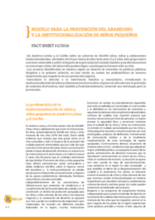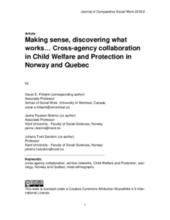This page contains documents and other resources related to children's care in the Americas. Browse resources by region, country, or category.
Displaying 2621 - 2630 of 3191
Two sisters in Colombia who were separated when they were children after an avalanche destroyed their town have been reunited 30 years later
The University of Toronto presents "Assessing Canada’s changing migration policy for migrant care givers," a presentation by Monica Boyd.
NYC-based organization offers volunteer "Interim Parenting Program" for biological parents considering adoption for their newborns.
This study examines whether parental migration can affect health and cognitive ability of left-behind children aged at 5-8 years old in Ethiopia, India, Peru, and Vietnam.
Legislation will soon be introduced in the U.S. state of Georgia to address concerns stemming from a recent "kinship care" study conducted to assess how the state could improve services to support grandparents and other relatives who take children into their homes when their parents can no longer care for them.
This study focused on a particular dimension of teenage motherhood in foster care: participants' efforts to break the cycle of child abuse and neglect with their own children.
The current study employed interpretative phenomenological analysis to explore 18 in-depth, qualitative interviews from six participants on the meaning and experience of motherhood among teenage mothers in the United States in foster care in the and in the years immediately after ageing out.
Este informe presenta información sobre el problema de institucionalización de niños en América Latina y el Caribe.
This study seeks to understand collaboration dynamics in social services for determining what strategies work best in facilitating collaborative endeavors in specific policy and institutional environments.
This article from the Los Angeles Times reports migrant children in the government's care were placed in U.S. homes and left vulnerable to human trafficking due to sometimes nonexistent screening by the Department of Health and Human Services.



